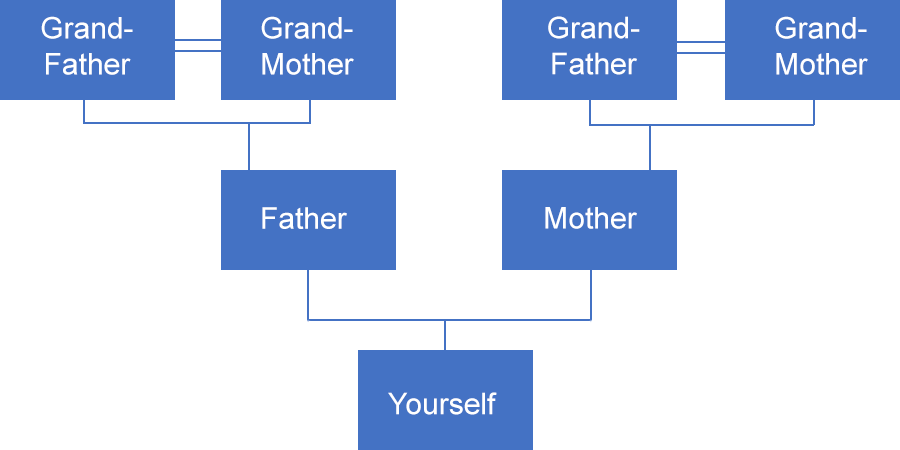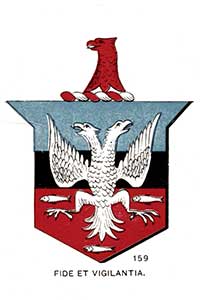Irish Genealogy
Below can be found a range of material on the library that will hopefully prove useful to those engaged in tracing their Irish ancestry. But first, here are a few tips for your family research:
Researching Your Irish Family History
In recent years there has been a huge increase in the numbers of people wanting to research their families.
Family history is much more than finding dates of life events, it is about learning about the lives of our ancestors and what their circumstances were.
For instance, the book Ireland’s Welcome to the Stranger has proved very informative to many who wished to understand why their ancestors left Ireland in the mid-nineteenth century to make a new life for themselves in North America.
To start with you need to find out what the family already knows.
Find out if anyone else is researching your family, talk to older family members and encourage them to let you see any photos or documents that they may have.
Remember, the more folk talk the more they remember!
Taking a photograph of the items is quick and easy and don’t forget to make notes or make a voice recording of their comments.
It is also important to keep a record of where you got the information so that in the future you know exactly where the photo/document/newspaper cutting came from.
There will be times in the future when you say to yourself “Where did I get that information!?”
When beginning your research start with what you know, which should be your own birth date, parents’ names, their marriage date, and any other details.
Sketch out a family tree so that you have a visual representation of your information, and add known dates or approximate dates of birth, marriage and death.

This will help you to identify where there are gaps in your information.
Siblings can be added and are usually drawn with the eldest on the left working to the youngest on the right of your diagram.
There are many similar diagrams, such as tree outlines and pedigree charts, freely available online for download.
Work back in time using birth, marriage, and death registrations to find more information.
Civil Registration of births, deaths and marriages in Ireland began in 1845 for non-Catholic marriages and 1864 for births, RC marriages and deaths.
A birth registration will give you the date of birth, where the birth took place, the child’s name, the father’s name, address and occupation, name of the mother and her maiden name, and who registered the birth and when.
An illegitimate birth usually has only a mother’s name, but occasionally a father did wish to be identified as such, and if so was required to attend at the time of registration.
Registration was required to take place within 6 weeks of a birth and a late registration incurred a fine.
It was not unknown for parents to change the birth date when registering! Some children were registered without a name, just recorded as male or female.
Knowing the name of the father and mother will take you to the next step back in time, looking for their marriage.
A marriage registration/certificate will provide the date and place of marriage, the names, residences and occupations of the bride and groom and the names and occupations of the fathers of the bride and groom.
Witnesses names may also provide connections to other family members.
Knowing the father’s name and occupation will help in the search for the birth of the bride or groom, taking your search back in time at least 20 years.
Death registrations provide the name, age and place of death, but it can be difficult to ascertain that you have the correct record.
A child is sometimes registered as “son of a labourer” and the place of death given may not be the family home.
Be cautious too about the age attributed to an adult as the information is only as accurate as the knowledge of the person registering the death.
A distant relative may be 10 years out in their estimation of the deceased’s age, making it more difficult to find a birth record for the individual.
Be aware also of inconsistencies in the spelling of names in official documents.
Robert E. Matheson's Varieties and Synonymes of Surnames and Christian Names in Ireland (see below) provides an extensive list of spelling variations and alternative names under which an individual may have been registered in the birth, marriage and death records.
The Census of Ireland is another great source of information (See The National Archives of Ireland link at the bottom of this page).
The only complete censuses are 1901 and 1911, with some fragments from the 19th Century.
Most people can find family in these records, which will give you names, ages and places of birth as well as occupations.
Be sure to look at the image of the form, (Form A) not just the transcription, as there are often mistakes in the transcription.
There are also forms describing the quality of the house and number of outbuildings, giving you some idea of their living conditions.
To find records before registration usually means searching church records. Very few are online, but some organisations have transcribed and/or indexed baptisms, marriages, burial records and headstone inscriptions.
Newspapers provide little gems of information to add to your story, whether it is a marriage notice before registration, a death notice with a place of burial, or a court report on a fine for speeding!
Be methodical about your research recording where you found information and where you looked and didn’t find information. Have a system of folders for different surnames or family groups. These can be paper or on computer.
The advantage of a family tree program on computer is that it will allow you to print your records in a tree format or a range of genealogy reports. It is also easier to find a particular person to add new information.
If someone disappears from the usual records think about emigration.
There are passenger lists available online, some free, some on subscription websites, for passengers leaving the UK and those arriving from ports other than Europe.
The subscription websites also have census records for Britain, USA and Canada. The most recent USA census available is 1940.
At some stage you will want to share your research with family members, but don’t put it off until you are ‘finished’ as your family tree will never be finished! Providing them with some information may jog memories and help to enhance your work.
Researching your family is a great pastime, and can uncover all sorts of family stories, and as you get to know other sources of records, where they are and what they contain, you will be able to broaden your tree with all those brothers and sisters in each generation, and make the story more interesting with, e.g., land or school records!
A Genealogical History of Irish Families
John Rooney's A Genealogical History of Irish Families (1895) has almost 500 entries giving details of family origins, meanings of ancestral names, descriptions of the clan territories, together with associated crests and armorial bearings, and in many cases some background history of the families and famous people associated with them. A number of the lengthier family histories contain images of significant historic events and personalities.

Irish Pedigrees

Apart from some very useful history, including on the Cromwellian Settlement, the Plantation of Ulster, the arrival of the Huguenots and Palatines in Ireland, etc., John O’Hart’s Irish Pedigrees, or, the Origin and Stem of the Irish Nation provides approximately 1000 family pedigrees, some of which include valuable information on births, marriages, deaths, and emigration.
Special Report on Surnames in Ireland

Robert E. Matheson’s Special Report on Surnames in Ireland provides information on the distribution, derivation and ethnology of surnames found in Ireland towards the close of the 19th century.
It includes an extensive list of surnames having five or more birth entries recorded by the registrars in 1890.
The figures are broken down by province and, where applicable, the counties in which the surname was most prevalent are indicated.
The book is extremely useful for helping to ascertain the province and county from which particular families most likely originated.
Varieties and Synonymes of Surnames and Christian Names in Ireland
In Varieties and Synonymes of Surnames and Christian Names in Ireland Robert Matheson explains the difficulties faced by registrars at the beginning of the 20th century.
Language differences, customs and illiteracy, among other factors, often led to wide spelling variations and even alternative names being entered in the records.
For example, the surname “Alexander” in parts of Ulster was spoken and written variously as “Elshner”, “McElshunder”, “McKelshenter”, to name but a few.
The book provides an extensive list of surname variations so that if those researching their ancestors draw a blank from the records under a principal name then they have the option of trying under its known spelling variations as identified in this book.
See the Overview and Tips page of Varieties and Synonymes of Surnames and Christian Names in Ireland.
